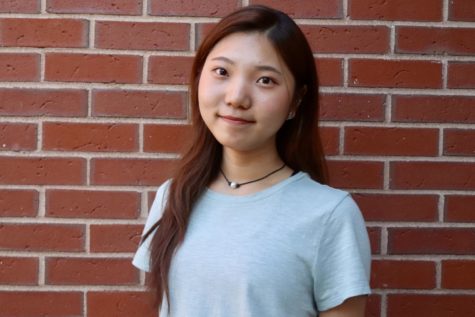Course selection stirs ambivalence for the next school year
Credit: Katherine Kim
The 2020-2021 school year is coming to an end in just a few months, and students are planning their schedules for the fall. Excitement over course selections also comes with worry about choosing the appropriate classes. “[I was stressed] because I didn’t want to choose the wrong ones [and] be stressed out next year or pick [a class] I didn’t like,” sophomore Jane Gargano said.
With summer just a few months away, 9th-11th grade students have to decide which classes they will take for the next school year. Wayland High School offers a wide variety of options for both main courses and electives that students can explore and find their interests in. However, the large selection makes it challenging for some students to pick classes that will fit together for a low-stress situation.
This year’s freshman class has not had the opportunity to learn in-depth about WHS’s courses due to COVID-19. The pandemic has made it extremely difficult for some students, like freshman Amy McCormack, not to stress about their sophomore year.
“With COVID-19, [it’s more uncertain] what next year will be like,” McCormack said. “I am also nervous that I [might] regret the electives that I chose and [that] I might be over-stressed.”
The process of simply deciding on classes based on a list can be stressful for many students. Some wish the list of courses offered were more easily accessible while others desire a more explicit description with more detail of each course available.
“I think it would be helpful if the [course descriptions included the workload],” sophomore Katie Schouten said.
For many students, electives are the most challenging classes to choose because of the sheer amount of options. Picking an elective that is of interest is incredibly important, as it will be an extra class with an additional workload.
“I was stressed about choosing an elective because I want to do [the] Anatomy [and Physiology elective],” sophomore Ashley Rice said. “However, it is not common for juniors to get into [this class.] As a backup, I want to do Investing and the Creative Economy (ICE) or Entrepreneurship and Business Management (EBM).”
The lengthy list of classes offered at WHS leaves students stressed about choosing from their options. Some of their fears include making the wrong decision and not enjoying their courses next year.
“I was definitely stressed [about] choosing my [main courses] because it seemed so final,” McCormack said. “If I choose ‘wrong’ or badly, I could mess up all of next year.”
Although some students like McCormack feel anxious about their decisions, sophomore Jane Gargano has confidence in her selection. Talking to others and getting a second opinion can greatly impact a student’s choices.
“I have talked [about next year’s courses] with my parents and my guidance counselor, and their [suggestions are] what all of my teachers have recommended [for] me,” Gargano said. “They are very similar to the course load that I have taken this year, so I feel confident in my ability to [take them] next year.”
To feel satisfied in their decisions, many students look towards others for advice. Some ask their parents, guidance counselors or friends to aid in their decision-making process. Seeking diverse opinions has been beneficial in helping students reach their conclusion. Students have discovered that using resources around them has been helpful in planning for their future and big decisions ahead of them.
“I talked to my parents because they both have different ideas of what is most important,” Gargano said. “My mom thinks English is important, and my dad thinks math is more important, so I get both sides on that. I talked with my guidance counselor because he knows a lot about college admissions, and I talked to my friends because I wanted to see what people were generally doing this year.”
Your donation will support the student journalists of Wayland High School. Your contribution will allow us to purchase equipment, cover our annual website hosting costs and sponsor admission and traveling costs for the annual JEA journalism convention.

Katherine Kim, Class of 2022, is a features editor and second year reporter for WSPN. She plays for the high school’s volleyball team. Outside of school,...





![Last Wednesday, the Wayland School Committee gathered to discuss a number of topics regarding the health curriculum and Innovation Career Pathway course. Another large topic of conversation was the ways to potentially mitigate distracting cell phone usage. "These [phones] are going to distract your learning and social relationships," Superintendent David Fleishman said. "That's concrete right there."](https://waylandstudentpress.com/wp-content/uploads/2025/06/Screenshot-2025-06-04-at-9.49.31 PM-1200x886.png)



























![Troy Hoyt finishes the Boston Marathon, running for the Hoyt Foundation. T. Hoyt is the son of Hoyt Foundation CEO Russ Hoyt.
“[Running a marathon] might seem like a big thing, when it’s presented to you at first, but if you break it up and just keep telling yourself, “Yes, you can,” you can start chipping away at it. And before you know it, you’ll be running the whole 26 miles, and you won’t even think twice about it.” T. Hoyt said.](https://waylandstudentpress.com/wp-content/uploads/2025/04/C36E8761-1CBB-452E-9DF2-543EF7B1095E_1_105_c.jpeg)











































![The 2020-2021 school year is coming to an end in just a few months, and students are planning their schedules for the fall. Excitement over course selections also comes with worry about choosing the appropriate classes. "[I was stressed] because I didn't want to choose the wrong ones [and] be stressed out next year or pick [a class] I didn't like," sophomore Jane Gargano said.](https://waylandstudentpress.com/wp-content/uploads/2021/03/6tuteOueW8wWZCzLFcaixO9xuaDsDBTJ4giFPtNA.jpeg)